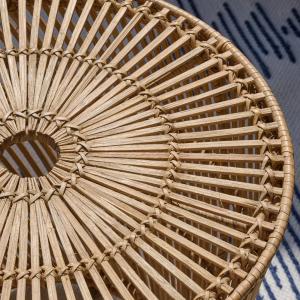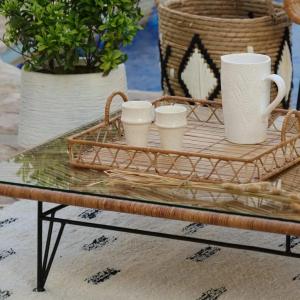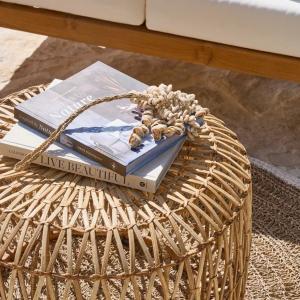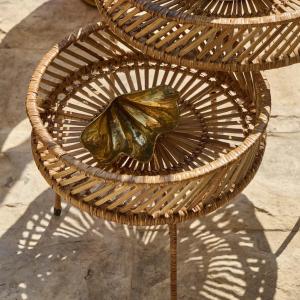Eco-Friendly Rattan Furniture: Coffee Tables and Side Tables for Cafés and Beach Clubs
Eco-Friendly Style in Hospitality: Rattan Coffee Tables for Modern Interiors
DUBAI, AL MANARA, UNITED ARAB EMIRATES, September 19, 2025 /EINPresswire.com/ -- In recent years, the hospitality industry has undergone a noticeable transformation. Cafés, restaurants, and beach clubs are no longer judged solely by their menus or service. Instead, design, atmosphere, and sustainability have become decisive factors in guest satisfaction. Interior choices influence how long visitors stay, whether they return, and even how they talk about their experience online.Within this context, furniture plays a central role. Chairs and tables are not just functional objects; they shape the spatial identity of an establishment. Among the different options available on the market, rattan furniture has emerged as a popular solution, especially for venues that wish to combine natural aesthetics, durability, and environmental responsibility.
This release provides an in-depth look at the role of rattan tables, particularly coffee tables and side tables, in creating sustainable, stylish, and functional spaces for modern hospitality businesses.
Section 1: Why Material Choice Matters in Hospitality
Furniture materials affect three key aspects of business success:
Guest perception – Aesthetic appeal and comfort shape the overall impression.
Operational costs – Durability and maintenance determine long-term financial efficiency.
Sustainability profile – Increasingly, customers judge establishments by their environmental footprint.
Plastic and low-cost metal furniture often fails to meet these expectations. While initially inexpensive, they deteriorate quickly under intensive use, fading, cracking, or corroding. This results in frequent replacements, higher expenses, and a negative impression on guests.
By contrast, natural solutions like rattan present a balance of form and function. Rattan grows rapidly, requires limited processing, and offers structural strength. When used in coffee tables and other rattan furniture, it provides both visual warmth and long-term reliability.
Section 2: The Environmental Benefits of Rattan Furniture
Sustainability is more than a trend—it is becoming a standard in hospitality. Guests are increasingly conscious of the ecological footprint of the places they visit. Research indicates that a large proportion of consumers prefer businesses that align with their environmental values.
Rattan furniture stands out in this regard for several reasons:
Fast growth rate – Rattan can grow up to 30 cm per day, making it one of the most renewable natural resources.
Minimal processing – Unlike plastics or metals, which require intensive energy and chemicals, rattan is processed naturally, often without toxic coatings.
Biodegradability – At the end of its lifecycle, rattan fully decomposes, returning to the environment without leaving harmful residues.
Local economies – Rattan is harvested and processed in tropical regions, supporting sustainable local industries and reducing the need for long-distance manufacturing chains.
In comparison, plastic tables may last for a short period but persist in landfills for centuries, while metal requires heavy energy input to produce. Choosing eco-friendly rattan tables signals environmental responsibility while also reducing long-term waste.
Section 3: Coffee Tables as a Core Element of Guest Experience
In cafés and restaurants, coffee tables serve more than a practical purpose. They become central to how guests interact with space. The size, shape, and height of tables influence how comfortably people eat, drink, work, or socialize.
Optimal height – For coffee shop use, 40–45 cm is considered ideal. It ensures easy placement of cups, plates, or laptops.
Surface size – Smaller square tables (60×60 cm) are suitable for individual customers, while larger rectangular or round models accommodate groups or business meetings.
Ergonomics – Rounded edges and stable construction reduce accidents and enhance comfort, especially in high-traffic venues.
Well-designed rattan coffee tables meet these requirements while adding a natural, welcoming aesthetic. Unlike colder materials such as metal or glass, rattan contributes warmth and texture, which encourages guests to stay longer.
Section 4: Rattan Side Tables and Flexible Layouts
Beyond coffee tables, rattan side tables provide adaptability that is highly valued in modern hospitality design. Mobility and compact dimensions allow businesses to restructure spaces quickly for different functions—morning coffee service, afternoon business meetings, evening social gatherings, or special events.
Advantages of using side tables include:
Quick rearrangement of seating for varying guest numbers.
Easy creation of event layouts, from buffets to workshops.
Simplified cleaning and maintenance due to lightweight construction.
Seasonal flexibility: side tables can be placed outdoors in summer and moved indoors in cooler months.
This versatility is especially important for smaller cafés and beach clubs, where efficient use of space is essential for profitability.
Section 5: Durability in Challenging Environments
Hospitality furniture faces intensive use and demanding environmental conditions, particularly in outdoor or coastal settings. Sunlight, humidity, and mechanical stress quickly degrade low-quality materials.
Properly crafted rattan furniture resists these factors when treated correctly:
Moisture resistance – High humidity and splashes of water do not damage rattan when it is sealed with natural protective coatings.
UV protection – Unlike plastics, which fade and become brittle, rattan retains its color and strength under sunlight.
Mechanical durability – Quality weaving and strong frames allow rattan tables to withstand heavy daily use.
For beach clubs, where salt air and sand present additional challenges, this resilience is particularly important. Investing in durable rattan pieces prevents frequent breakdowns and reduces operational interruptions.
Section 6: The Aesthetic Contribution of Rattan
Ambience is central to hospitality design. Even the most well-prepared food or drink cannot compensate for an unattractive or uncomfortable interior. Rattan furniture contributes a natural and timeless visual identity that fits a wide range of design styles:
Tropical atmospheres – Paired with greenery and bright textiles, rattan creates a relaxed, vacation-like feeling.
Scandinavian minimalism – When combined with white walls and simple forms, it produces a clean and calming space.
Eco-loft concepts – In urban settings, rattan blends well with concrete and greenery, softening industrial aesthetics.
Mediterranean design – Rattan complements stone, terracotta, and warm shades for a coastal European effect.
The woven texture interacts with light, producing dynamic patterns that add depth and character. This natural aesthetic makes coffee tables and side tables not only functional but also integral design elements.
Section 7: Long-Term Economic Value
While initial costs of natural furniture may be higher than those of synthetic alternatives, the long-term financial perspective is different. Businesses that invest in rattan tables benefit from:
Reduced replacements – Quality rattan pieces last for years, even under heavy use.
Lower maintenance – Simple cleaning and minimal treatment keep furniture in good condition.
Improved guest satisfaction – Comfortable, attractive interiors encourage repeat visits and positive reviews.
Organic promotion – Guests often photograph and share appealing interiors, providing free visibility through social media.
This combination of durability, lower operating costs, and indirect marketing makes rattan a rational choice for establishments aiming for stability and growth.
Section 8: Maintenance and Care for Rattan Tables
Proper care extends the lifespan of rattan furniture considerably. Recommended practices include:
Regular cleaning – Dust removal with a soft cloth or vacuum attachment.
Moisture control – Avoid prolonged exposure to standing water; use covers or move tables during heavy rain.
Sunlight moderation – While resistant to UV, rattan benefits from shaded placement to maintain color.
Protective treatments – Occasional application of natural oils or protective sprays to preserve fiber flexibility.
These measures are simple to implement and significantly reduce wear, ensuring that coffee tables and side tables remain attractive and functional for decades.
Section 9: Broader Implications for the Hospitality Industry
The adoption of rattan furniture is part of a larger global shift in design and consumption. Businesses across industries are moving toward environmentally conscious practices. For hospitality, which directly influences guest emotions and perceptions, the choice of materials is particularly visible.
Sustainable practices not only reduce environmental harm but also strengthen reputations and attract eco-conscious customers. By selecting rattan tables and furniture, cafés and beach clubs demonstrate alignment with contemporary values while also securing practical advantages.
Conclusion
Rattan furniture, and specifically rattan coffee tables and side tables, represents a convergence of aesthetics, sustainability, and durability. It addresses the core needs of modern hospitality: creating inviting spaces, reducing operational costs, and aligning with environmental expectations.
In an industry where first impressions are decisive, furniture choice is more than decoration—it is a strategic decision. Natural, functional, and sustainable, rattan offers a path forward for cafés, restaurants, and beach clubs that seek to remain competitive in a changing market.
Carol Sukkar
Home and Soul Furniture Trading LLC
+971 56 112 1444
email us here
Visit us on social media:
LinkedIn
Instagram
Facebook
X
Legal Disclaimer:
EIN Presswire provides this news content "as is" without warranty of any kind. We do not accept any responsibility or liability for the accuracy, content, images, videos, licenses, completeness, legality, or reliability of the information contained in this article. If you have any complaints or copyright issues related to this article, kindly contact the author above.




